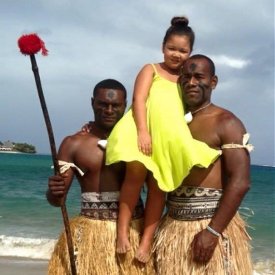 792,000 people visited Fiji in 2016 – almost equivalent to the nation’s population. Clearly people have discovered the big Bula smiles and the relaxed way of life and it is resonating in people’s hearts.
792,000 people visited Fiji in 2016 – almost equivalent to the nation’s population. Clearly people have discovered the big Bula smiles and the relaxed way of life and it is resonating in people’s hearts.
Can I retire to Fiji?
Immigration to Fiji is very strict. Before you start planning your retirement in Fiji, the first thing you will need to do is check if you are legally permitted to reside in Fiji. If you don’t qualify for Fiji Citizenship, consider a Residence Permit on Assured Income.
This permit may be issued to a person who has assets outside the Fiji Islands at his/her disposal of an amount sufficient to ensure that he/she will not become a charge on public funds whilst residing in Fiji. You will have to pay an application fee of $452FJD (approximately $220US plus Issue and Bond fees) and meet certain requirements, such as:
- Completed and Signed Application Form
- Formal Request Letter
- 2 certified passport sized photos
- Copy of Passport (Bio-Data)
- Copy of Birth & Marriage Certificate or Kinship Certificate
- Police Report
- Medical Report
- Latest Offshore Bank Statement
- Retirement Scheme Statement
Will Fiji suit me?
If you can legally retire in Fiji, perhaps now ask yourself whether you actually should? Daily life unfolds at a very different pace to the life you may be used to. Many retirees have spent holidays in Fiji for years and have dreamt of retiring there for just as many. However, understanding that life on holidays in a luxurious resort is very different to day-to-day life whilst living in Fiji will help you make the right decision. Some of the more important factors to consider before retiring to Fiji would be:
Healthcare
 Fiji is still a developing country. As such, it’s healthcare is not of the same westernized standard that you may be accustomed to. Hopefully retirement will bring you long days of leisure and sipping cocktails with the breeze in your hair, but if you have any health issues, it is a good idea to consider whether your needs will be met on a tropical island, known more for it’s beautiful Bula Smiles than their healthcare facilities.
Fiji is still a developing country. As such, it’s healthcare is not of the same westernized standard that you may be accustomed to. Hopefully retirement will bring you long days of leisure and sipping cocktails with the breeze in your hair, but if you have any health issues, it is a good idea to consider whether your needs will be met on a tropical island, known more for it’s beautiful Bula Smiles than their healthcare facilities.
There is a private hospital in the country’s capital (Suva Private Hospital), and a large government one also in Suva. Each of the bigger towns have their own district hospital as well. Medication is easily obtained from pharmacies, and in my experience they can order almost anything in from Australia or New Zealand with a bit of notice.
One friend of ours got the flu, which turned ugly, and after being treated in a private hospital unsuccessfully asked to be moved to the government hospital where the international treating doctors there discovered something more sinister. She was medivacked back to Australia for urgent treatment (at a cost of $40,000AUD (over $30,000US) – thankfully she fully covered). I was talking to a doctor at a Gold Coast Hospital recently and she confirmed she knew of three other cases very similar out of Fiji. Even simple ailments seem to escalate very quickly in Fiji.
My personal experience with healthcare in Fiji is thankfully fairly limited, however, it has been enough to know is that it is vital to obtain quality health and medical insurance if you are moving to Fiji for retirement.
Fiji Time
 It’s emblazoned on almost all souvenirs you will see in Fiji, and chances are you’ve seen the phrase on a t-shirt on someone in your home country.
It’s emblazoned on almost all souvenirs you will see in Fiji, and chances are you’ve seen the phrase on a t-shirt on someone in your home country.
‘Fiji Time’ is about life unfolding in it’s own time, and it is most certainly the Fijian way of life.
Retiring to Fiji, one of your greatest challenges will be to overcome this island custom and get on board with it (quickly!). Living within the confines of ‘Fiji Time’ for things that you may not have had to deal with in a holiday setting, like electricity, banking, water, transport etc. you will likely try to reject it, or change it. Let me be clear – you have no hope – you may as well board the plane back home if that’s your intention. ‘Fiji Time’ is in Fiji to stay.

Leave a Reply